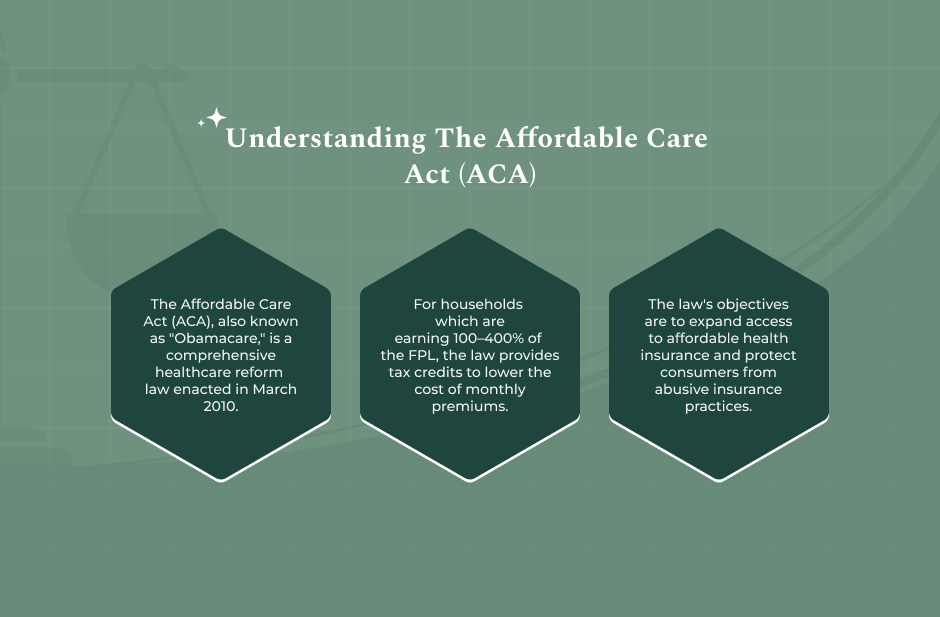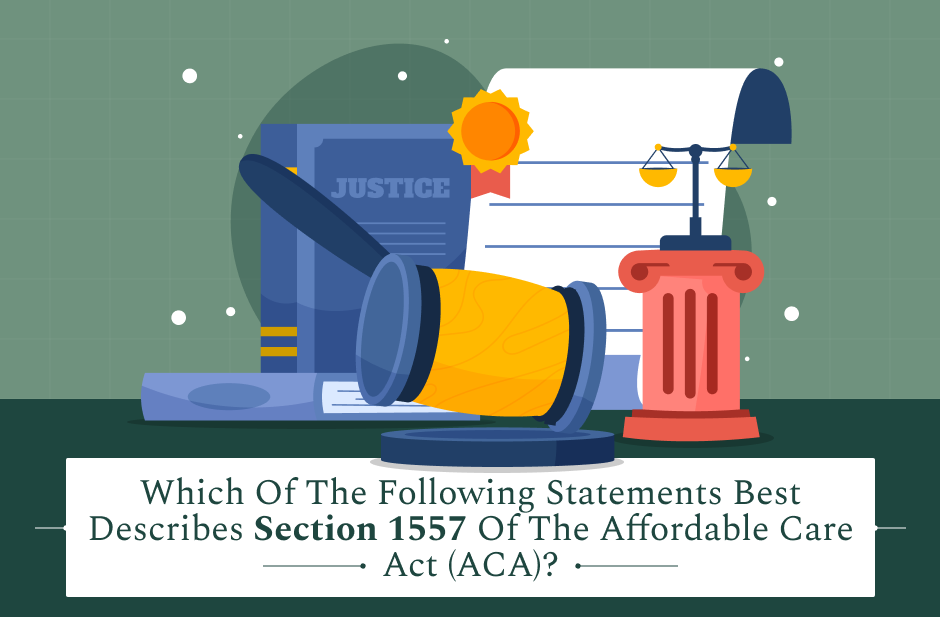Which of the following statements best describes section 1557 of the Affordable Care Act (ACA)?
(1) Section 1557 introduced completely new concepts of civil rights protections on the basis of age and disability.
(2) Section 1557 incorporates earlier civil rights protections in regard to race, color, and national origin, but does not incorporate protections against discrimination based on age and disability.
(3) Section 1557 incorporates earlier civil rights protections in regard to race, color, national origin, disability, age, and sex.
(4) Section 1557 introduced completely new concepts of civil rights protections on the basis of race and sex.
If your answer is option (2) Section 1557 incorporates earlier civil rights protections in regard to race, color, and national origin, but does not incorporate protections against discrimination based on age and disability, then you are absolutely correct!
If you have ever questioned whether Section 1557 of the ACA includes civil rights protections for age and disability, then you are definitely not the only one. Your answer is right, but it lacks completeness without the proper context.
Maybe you aren’t aware of Section 155,7, as it is stated in the HHS Final Rule that discrimination based on race, color, national origin, sex, age, and disability is prohibited in any health program or activity that receives federal financial assistance.
What is the ACA, by the way? And what are some of the things you should know about this act?
If these are some of the things that you want to know about, then you have come to the right place. Therefore, keep on reading this blog till the end…
What Is The Affordable Care Act (ACA)?

Enacted in 2010 by then-President Barack Obama, the ACA aimed to enhance healthcare accessibility and affordability across the U.S.
Investopedia defines this act as the “comprehensive healthcare reform.” The ACA was set out with the purpose of changing the health insurance industry and to help bring down the cost of health insurance for those individuals who are eligible.
The law offers both premium tax credits and cost-sharing subsidies to make it easier for lower-income individuals and households to afford their health care.
The law states that nearly all insurance plans, even those purchased on the Health Insurance Marketplace, must provide certain preventive services free of charge to the insured. The services include:
- Routine check-ups.
- Patient education.
- Immunizations.
- Variety of health screenings.
By including civil rights provisions such as Section 1557, The Commonwealth Fund explains that Congress recognized that eliminating discrimination was essential to achieving equitable health outcomes.
Section 1557 Of The Affordable Care Act (ACA)
Section 1557 is the ACA’s nondiscrimination provision. It makes it unlawful for any health program or activity receiving federal financial assistance—or administered by HHS or created under ACA Title I—to discriminate based on race, color, national origin, sex, age, or disability.
As mentioned on the official website of the HHS, “Section 1557 prohibits discrimination on the grounds of race, color, national origin, sex, age, or disability in certain health programs and activities.”
Importantly, it was the first federal civil rights law to broadly prohibit sex discrimination in healthcare.
The regulation clarifies that gender discrimination banned by Section 1557 encompasses harassment that is:
- The sex of a person.
- Pregnancy, childbirth, and other medically related conditions.
KFF reports that while the provision was already in place during the enactment of this act, it was only on April 27, 2024, that the Department of Health and Human Services (HHS) under the Biden administration finalized long-awaited revised regulations implementing Section 1557 of the Affordable Care Act (ACA).
Legal Foundation Of The Civil Rights Protections Under Section 1557 Of The ACA
In case you did not know, there are several existing civil rights statutes that Section 1557 integrates into rather than creating laws that are entirely new. Some of them include:
- Title VI, Civil Rights Act (1964): race, color, national origin.
- Title IX, Education Amendments (1972): sex.
- Section 504, Rehabilitation Act (1973): disability.
- Age Discrimination Act (1975): age.
Additionally, Section 1557 unifies these into healthcare contexts that receive federal funds. According to the Groom Law Group, “Entities subject to Section 1557 include any:
(1) health program or activity that, in any part receives federal funding or assistance; or
(2) program or activity that is administered by an executive agency or by an entity established by Title I of the ACA.”
Read Also: Empowering Individuals through Workplace Discrimination Laws
What Are The Key Protections Under Section 1557?
The provision of Section 1557 under the ACA provides individuals with several legal protections. Some of them that you need to know about include:
1. Protected Characteristics
Section 1557 covers race, color, national origin, sex, age, and disability, meaning providers and insurers cannot discriminate on these bases.
2. Health Program Coverage
The provision applies to any health program or activity receiving federal funds. The Congress states that these include:
- Hospitals.
- Clinics.
- Insurers.
- Exchanges.
- HHS-led programs.
3. Language Access
Title VI authorities ensure individuals with limited English proficiency receive translation assistance so they can access healthcare equitably.
4. Sex Discrimination: Expanded Interpretations
Initially broad under Obama, later narrowed under Trump, and largely restored by Biden’s 2024 rule—with protections covering gender identity, sexual orientation, sex traits (like intersex), pregnancy, and sex stereotyping.
Read Also: Criminal vs Civil Law: Key Differences and Implications
What Are The Enforcement Mechanisms Of Section 1557 Under The ACA?
The official portal of the Health and Human Services clearly states that Section 1557 is currently being enforced and has been so ever since the enactment of the ACA in 2010.
“Since that time, the Office for Civil Rights (OCR) has been receiving and investigating discrimination complaints under Section 1557,” states the authority.
Here’s what you need to know:
- Enforceable by OCR (Office for Civil Rights, HHS): Complaints can be filed through their portal or hotline.
- Private Right of Action: Individuals can sue under Section 1557 using the enforcement mechanisms of incorporated laws like Section 504 or Title VI.
Importance Of Section 1557 Under The ACA:
• For Patients: Ensures nondiscriminatory access to treatment, coverage, and language services.
• For Providers & Insurers: Necessitates compliance policies, training, and nondiscrimination protocols to avoid enforcement actions.
• Intersectional Awareness: Recognizes that discrimination often overlaps (e.g., age + disability + sex).
Your Legal Guide: Current State And The Controversies Of Section 1557
The scope of the provision has been in a regulatory Ping Pong. The definition has frequently changed as the government and administration keep changing.
For instance, during Obama’s administration in 2016, the definition and scope were broad. In 2020, it narrowed down when Trump came to power. From 2021 to 2024, the expanded definitions of the provision were restored. Additionally, as I have already mentioned, the final rule was passed in April 2024.
Courts have enjoined gender identity protections. And as Morgan Lewis mentioned, as of mid-2024, some provisions remain blocked
In June 2025, HHS rescinded its 2021 guidance that interpreted sex discrimination to include sexual orientation and gender identity—creating regulatory uncertainty for covered entities
In Neese v. Becerra, a federal appeals court ruled in December 2024 that doctors lacked standing to sue over Section 1557’s transgender health policy protections.
















